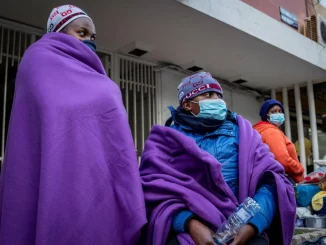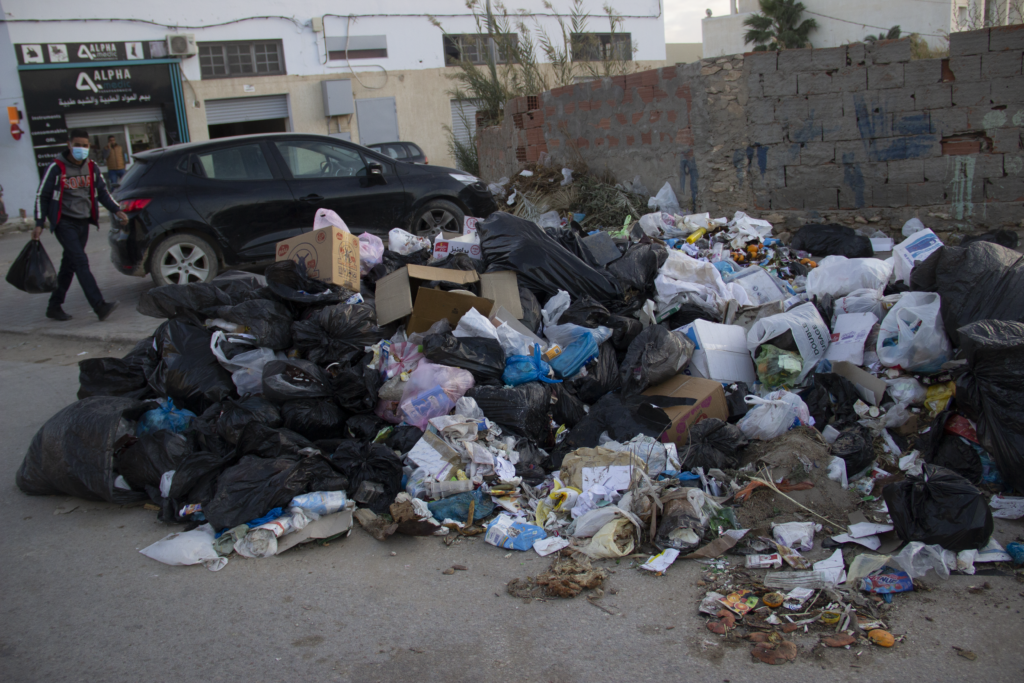
SFAX, Tunisia—Until the first week of December, mountains of garbage littered the center of the coastal city of Sfax. For more than two months, locals put up with thousands of tons of rotten household trash and hazardous medical waste left uncollected in public areas.
The crisis began after Sfax governorate authorities closed in late September the governorate’s main controlled landfill, El Gonna, in the town of Agareb, some 22 kilometers (13.6 miles) from the city of Sfax, due to opposition from the local population. (Tunisia is divided into provinces called governorates. Sfax governorate contains a city by the same name.)
The people of Agareb rejected the Ministry of Environment reopening the controversial dumping site. Residents said it was full and being used to dump toxic chemical waste, causing the spread of several diseases. Reported health complications include respiratory and skin disorders, sight problems, and infertility.
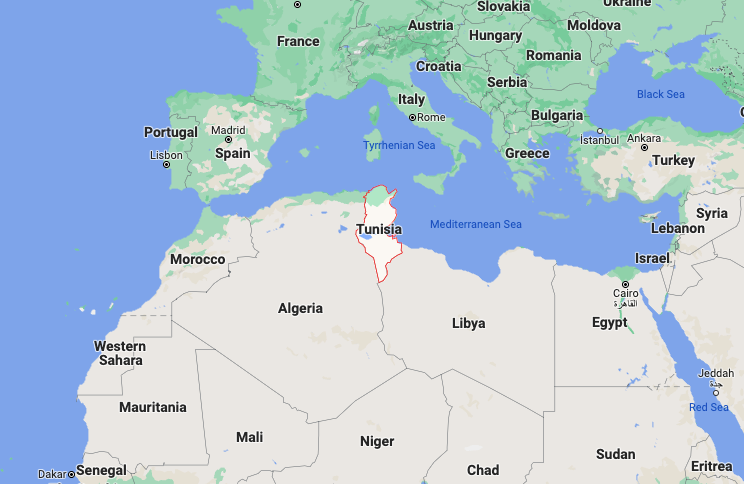
Some private waste-management companies are known to illegally dispose of toxic material—such as medical refuse and industrial waste from factories—in the landfill to avoid expensive treatment processes.
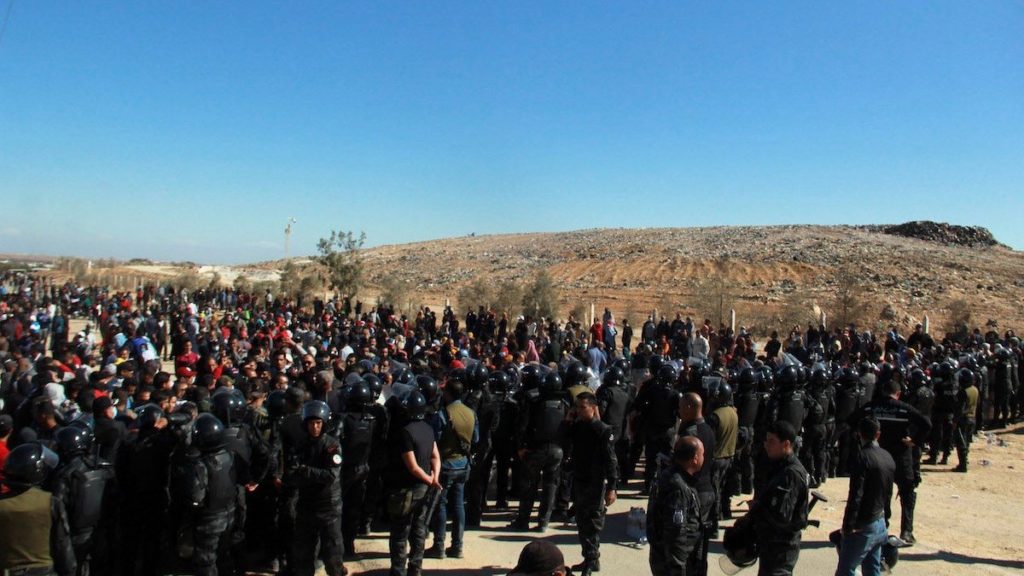
Protests Turn Deadly
Opened in 2008 as a near-term fix to ease the burden on the Sfax governorate, the dump at Agareb was originally supposed to close after five years.
“We had a problem of trust with the government, which has still not implemented the solutions that they had announced,” said Sami Bahri, a Agareb-based environmental activist, during a webinar Paris-based think tank Arab Reform Initiative organized in December.
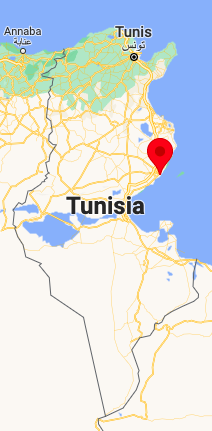
Weeks of protests against the trash crisis and the reopening of the landfill last month escalated on November 8 when security forces’ tear gas killed a protester. The next day, angry demonstrators burned a local national guard station. “We are choking on all this garbage!” was one of the main slogans of the day’s rallies.
The closure of the El Gonna site, which had already been overloaded since September, led to the accumulation of garbage and industrial waste on the streets of Sfax city. Local municipal services had stopped trash collection, citing a lack of alternatives for waste disposal.
“We are in a situation where seeing garbage in the open air becomes something ordinary,” said Hafez Hentati, coordinator of Collectif de l’environnement et du développement de Sfax (Environmental and Development Collective of Sfax) in the city of Sfax, speaking in an exclusive interview with Toward Freedom. “It’s dangerous for all economic and social activity, besides being a human health issue.”
The militant, who’s been campaigning on environmental issues for nearly 40 years, estimated above 44,000 tons of rubbish were discharged into the environment without any treatment for more than 70 days after the main landfill shut down.
“Sfax’s garbage issues have been ongoing since long ago,” said Aida Kchaou, a painter and active member of civil society in Sfax, in an interview with Toward Freedom. She alluded to years of government neglect. “People are used to dumping trash carelessly as if they want to punish the state somehow.”
The artist cannot remain indifferent to how environmental conditions have degraded in her region. In 2015, she performed an act of protest on Chaffar Beach, 26 kilometers (or 16 miles) south of the city of Sfax, by wearing plastic garbage bags and picking litter to raise awareness of the decaying state of the seashore because of long-time chemical industries in Sfax governorate.
Kchaou has paid more than one visit to Agareb, meeting residents and local activists, and taking part in small actions in the vicinity of uncontrolled hazardous landfills, very close to residential areas. Recently, she staged an action by standing in the middle of a dump near Agareb, holding her paintbrush as if she was going to cover all of the rubbish with paint. She ended by planting an olive tree. “I live my environment: I see there’s something wrong and I react,” the painter said.
Monem Kallel, professor at the National School of Engineering of Sfax and an environmental expert, pointed out the waste crisis is essentially connected with the method of burying waste in open dumps, which Tunisia has adopted for about 24 years.
“It’s an old policy—one of the worst approaches to waste management—that leaves the fate of the litter unknown and makes people think the state will take care of it,” the expert observed while speaking to Toward Freedom. “Meanwhile, the country’s dumps are getting filled up, and people are growing fed up with the accumulation of unremoved garbage.” He stressed an urgent solution to waste dumping, such as immediately hauling it away, must be accompanied by the longer-term sustainable process of sorting, treatment and recycling.
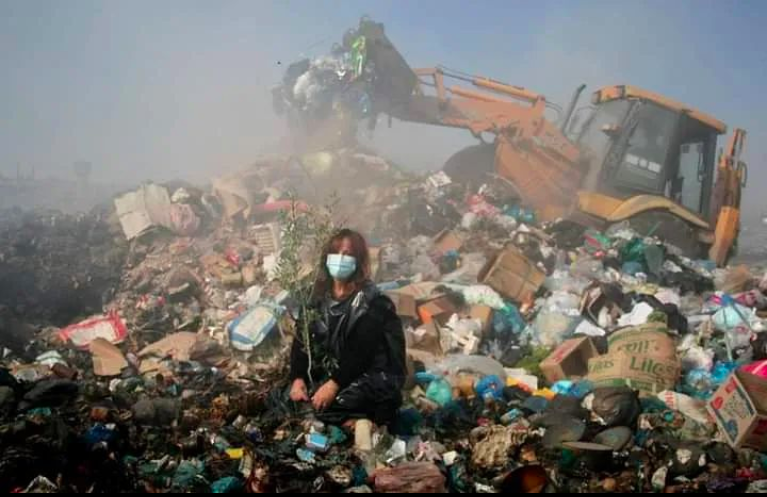
Striking Against Structural Stench
In the face of growing waste mismanagement, posing serious health and environmental risks, civil society groups in Sfax governorate announced they would hold a general regional strike on December 10. They also successfully filed a legal complaint against the parties responsible for the ecological catastrophe, namely the environment ministry, the National Waste Management Agency (Agence Nationale de Gestion des Déchets, or ANGED for short) and the region’s municipalities.
With the local and national government coming under pressure—just a few days before the anticipated strike—the prime minister’s cabinet decided to resume on December 8 the clearance and dumping of household waste in a temporary collection point located near the port. This plan depended on the rubbish heaps being transported within five months to a new landfill to be created on the road to a town in Sfax governorate’s countryside called Menzel Chaker, about 62 kilometers (about 38 miles) from the city of Sfax. The cabinet also resolved to develop a regional plan for recycling and waste recovery within three to five years.
For Hentati, postponing the general strike was a mistake because pressure that should have served to obtain guarantees from authorities dissipated. The government quickly came up with a package of urgent measures to solve the crisis to avert the labor action. Though, he said, “It did not make any real commitment.” He added residents in the city of Sfax have been left in a disarray, as they are cautiously watching the government’s decisions.
The environmental activist made clear the issue is fundamentally a structural one.
“Today, the garbage crisis in Sfax shows the limits of the long-applied waste treatment system, which only bypasses the problem without resolving it,” Hentati said.
Increasing numbers of local people are demanding the government introduce waste disposal policies that will protect their right to a safe environment because they refuse to allow their neighborhoods to be turned into landfills.
Poor responsibility sharing between the state and regional and local institutions have resulted in a deadlock in the handling of the ongoing crisis: The central government expects municipal councils to provide much of the waste management, while municipalities call on the state to find sustainable solutions.
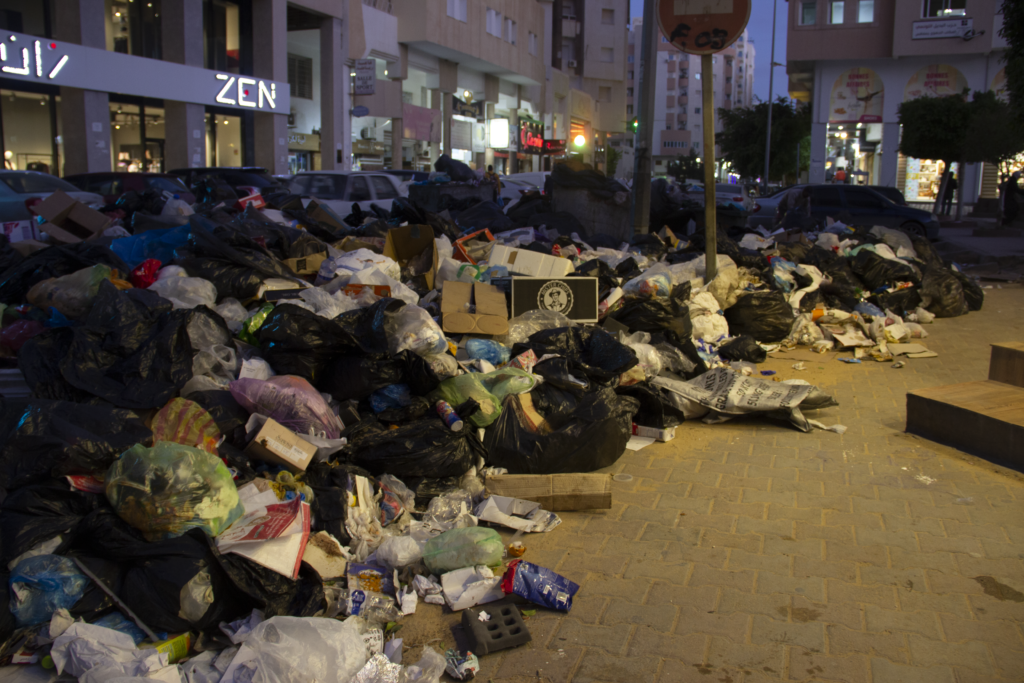
Trust In the Dumps
Given their proximity to citizens, local governments are the first bodies held responsible for failing to effectively deal with waste treatment. Yet, it should be noted Tunisia’s elected local councils, which have been operating since 2018, “face severe budgetary and human capital constraints,” as Lana Salman, researcher in urban governance and international development, wrote in a research paper published in April. “[It] is a highly lucrative sector where opacity and corruption are not only endemic, but also institutionalized,” she penned.
While municipalities are responsible for hauling garbage to temporary transfer centers with the ANGED’s assistance, the agency is in charge of transporting waste to the final destination at sanitary landfills and managing such landfills.
Kallel specified greater efforts are needed to raise environmental awareness among the concerned institutions as well as among people, and that an adequate budget should be allocated to make possible feasible solutions. “Rather than shifting the responsibility from one to another, if everyone is involved responsibly through the whole waste management chain, the crisis will be overcome,” he said, underscoring the important role citizens can play in contributing to environmental protection.
The specialist maintained that trust in state institutions needs to be restored, after years of unfulfilled promises. “If the state engages by taking serious gradual steps, the average citizen will be confident that a real solution to this crisis will come,” Kallel said. “Else, it will persist.”
Kchaou similarly referred to lack of public trust as a critical matter, blaming the country’s successive governments for appointing incompetent people to ministerial posts over the past decade. She contended people will hardly act in respect of environmental protection as long as they see the relevant government structures—local, regional and national—not providing waste treatment.
Long-standing dysfunctional governance and corruption within Tunisia’s state administration underlie the garbage emergency in the Sfax province. More than half of the country’s landfill sites have reached their maximum capacity, threatening the environment and human health.
The state neglect mirrors the lack of national strategy to develop recycling capacity to deal with solid waste in Tunisia. The Ministry of the Environment has opposed the closure of dumps as no alternatives exist. In October, the new environment minister, Leila Chikhaoui, said while visiting the city of Sfax that no immediate solutions were available in the governorate.
Raouia Amira, head of the sanitation, health and environmental committee in the municipality of Sfax, pointed to the country’s solid waste management strategy being discontinued in 2016. “We need a national strategy,” Amira told Toward Freedom. “To that end, the state needs to put in place a communication campaign and spare no expense.”
She thinks incineration is the most realistic approach to treating household waste in the Sfax governorate. Tunisia has long suffered waste management problems, with an estimated 2.5 million tonnes of rubbish produced annually, 63% of which is organic, and most of it buried in landfills without being processed, recycled or incinerated.
Sustainable Solutions
The thorny matter is aggravated by lack of investment in sustainable solutions and endemic corruption within the sector in the North African country.
In a press conference in 2014, lawyer Faouzia Bacha Amdouni presented findings of an independent audit revealing “colossal funds” intended for environmental projects were channeled through the Ministry of Environment and its agencies, ending up in the hands of the government of Prime Minister Zine El Abidine Ben Ali (1987-2011) and its allies. The advocate declared several figures within the agencies were working to conceal their involvement in corruption as well as their plan not to design new strategies. “The department of the environment itself was created in 2005, not to develop policies and innovative projects for waste treatment or sanitation stations, but to receive resources from international donors and invest them in personal projects benefiting the clans in power and their relatives,” she said at the press conference. Some of those international donors reportedly include the European Investment Bank, the Italian Agency for Development Cooperation, the World Bank and the French Development Agency.
In July 2020, then-Prime Minister Elyes Fakhfakh resigned following allegations of corrupt links to the waste industry. In December 2020, the environment minister was dismissed and arrested along with 23 other officials—including members of the ANGED, or National Waste Management Agency—for being linked to a scandal involving the illegal transfer from Naples, Italy, to the Tunisian port of Sousse of more than 200 shipping containers packed full of decaying household and medical waste disguised as post-industrial plastic waste. The Italian and Tunisian companies embroiled had signed a contract worth €5 million ($5.76 million) to dispose of 120,000 tons of Italian waste in Tunisian landfills.
An investigation published by Inkyfada last March revealed a vast network of corruption involving Italian waste.
The critical environmental situation in Sfax governorate poses a clear social challenge for President Kais Saied, who promised to close the El Gonna landfill during his 2019 presidential campaign. This came in a region that strongly supported his July 25 power seizure, in what his critics have called a coup.
The mobilizations against the re-opening of the toxic dump and the wider trash crisis in Sfax demonstrates Tunisian citizens’ yearning for a clean and sustainable environment. This, as they escalate their calls on the government to stop imposing short-sighted decisions without popular consent and demand it find alternatives to landfill sites.
“The extent of the garbage crisis we’ve experienced in Sfax has been of some use,” the artist Kchaou remarked. “If that didn’t happen, no one would be taking the issue seriously.”
Alessandra Bajec is a freelance journalist specializing in West Asia and North Africa. Between 2010 and 2011, she lived in Palestine. She was based in Cairo from 2013 to 2017, and since 2018 has been based in Tunis.



